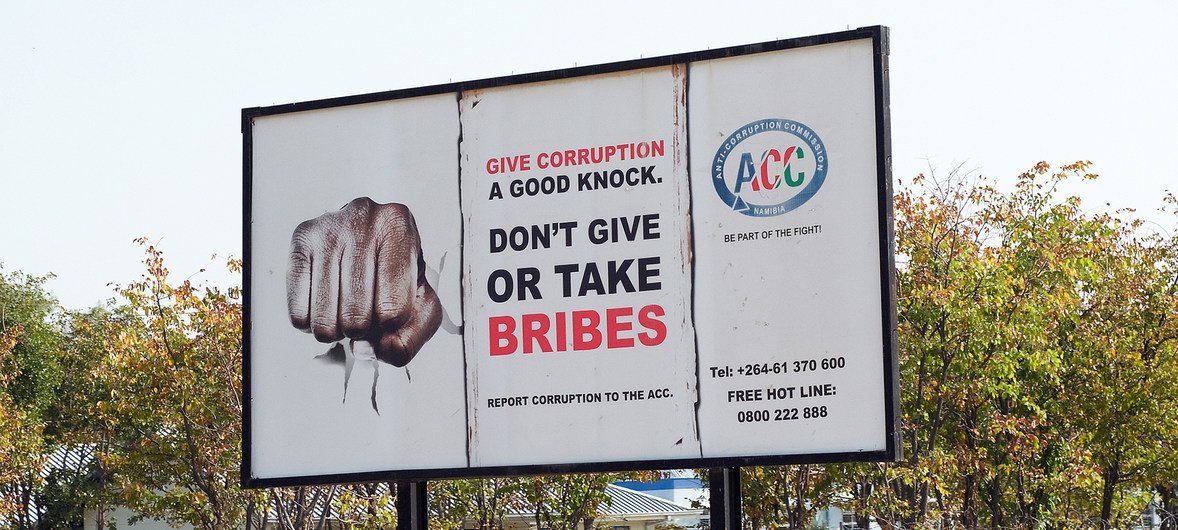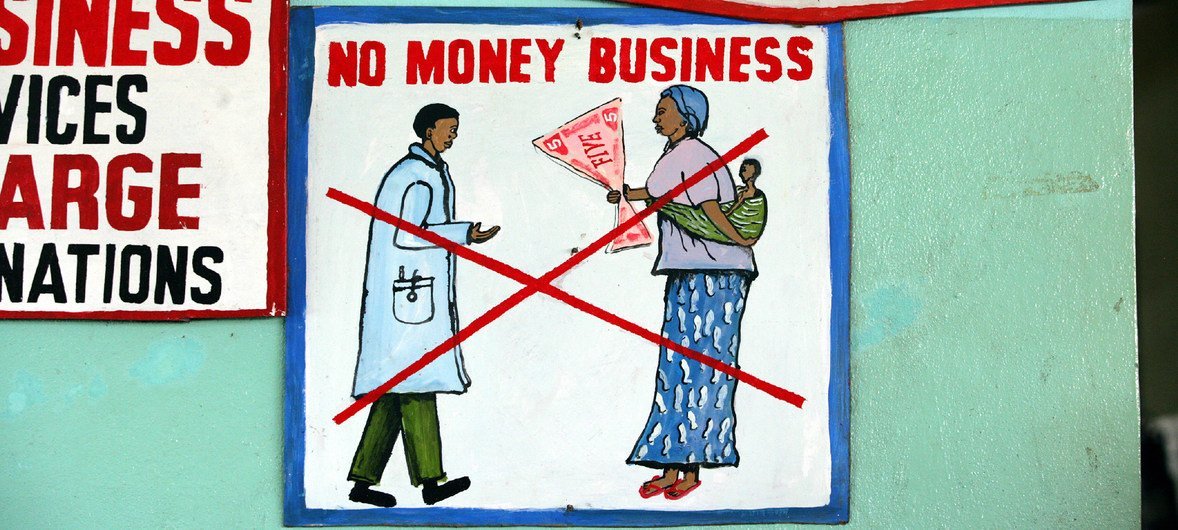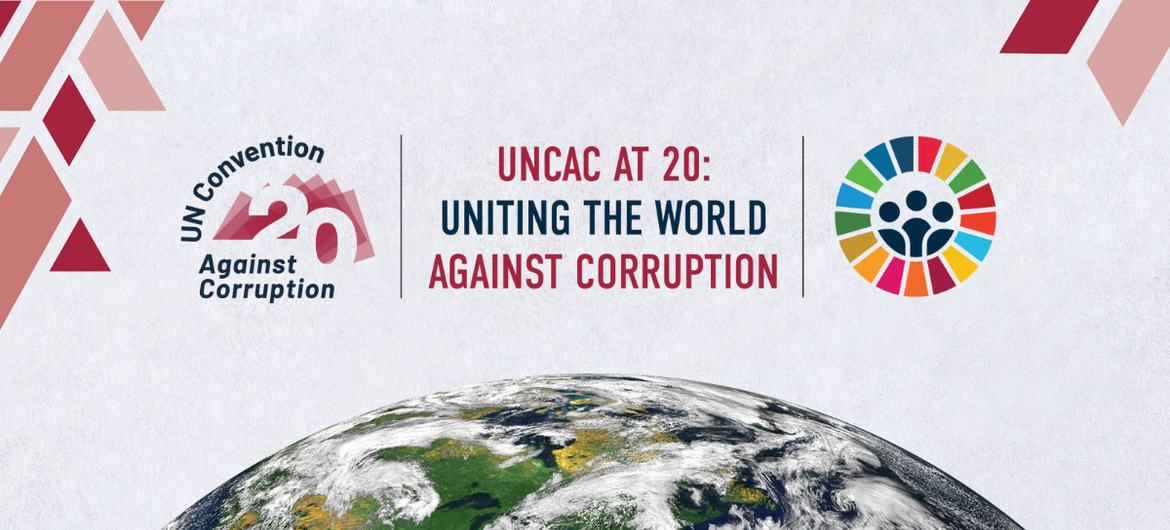Explainer: How the UN is promoting a ‘global commitment to fight corruption’

Countries across the world need to work together to ensure there is a “global commitment to fight corruption” according to the head of the United Nations Office on Drugs and Crime (UNODC).
The Executive Director of UNODC, Ghada Waly, was speaking ahead of what she describes as a “milestone” meeting taking place in Atlanta in the United States which will discuss how to improve international cooperation and to better prevent and tackle corruption.
It’s widely accepted that corruption diverts crucial resources, hampers essential services, enables organized crime, and deepens inequalities and grievances.
As the UN marks International Anti-Corruption Day, here’s what you need to know about why fighting corruption is important and how the UN contributes to those efforts.

How do we define corruption and what is the scale of the problem?
Corruption, according to UNODC, is a “fluid and evolving concept, signifying different things to different people.” One way or another, it affects all parts of the world.
It encompasses a huge range of activities including the misuse of public power, office or authority for private benefit, through bribery, extortion, influence peddling, nepotism, fraud or embezzlement.
The annual volume of bribes worldwide is estimated at one trillion dollars. Corruption causes the global economy to lose $2.6 trillion, accounting for more than five percent of global GDP.
It can erode basic public functions and the quality of life of people depriving them of their rights and access to services.
It also impoverishes countries and stifles economic growth, even of whole regions, and allows organized crime, terrorism and other illegal activities to flourish.

How are people impacted?
Evidence from across the world shows that corruption impacts the poor disproportionately.
In many countries, applicants for drivers’ licences, building permits and other routine documents have learned to expect a “surcharge” from civil servants.
At a higher level, larger sums are paid in bribes for public contracts, marketing rights or to sidestep inspections and red tape.
Corruption especially affects women and children because it diverts resources from many projects intended to end poverty.
Vast sums of money are lost to corruption that could be used to improve living standards and increase access to housing, health, education, and clean water.
It’s feared that with deepening corruption, countries will find it increasingly difficult to make progress towards the Sustainable Development Goals, the 17 targets agreed by countries around the world to end poverty, improve the lives and prospects of everyone, everywhere, whilst protecting the planet.
Enviro VIDEO:
How are corruption, the SDGs and more specifically the environment, linked?
Protecting people and the planet represents the central focus of the SDGs and will be a topic under the spotlight in Atlanta.
Corruption holds back progress on both counts as it fuels environmental degradation, including illegal mining, the destruction and exploitation of wildlife, forests, and marine species, criminal activities that can boost the profits of organized criminal groups.
Corruption also undermines safety and security and deprives governments of significant revenue streams, as well as robbing local communities of their wealth.
UNODC Executive Director Ghaly said that fighting corruption is a “vital cornerstone of our efforts to achieve the SDGs.
VIDEO:
What role does the private sector play in reducing corruption?
Representatives from the private sector will attend the meeting and according to Ms. Ghaly have a key role in reducing corruption.
“Business integrity is a powerful force to preserve and restore trust. It prevents corruption from infiltrating entire sectors and creeping into institutional culture,” adding that it stops the stifling effect of corruption on competition and reduces legal, financial, and reputational risk for companies.”
When corruption is widespread, foreign direct investments are discouraged and businesses are reluctant to invest in national markets where competition is not fair or transparent.
That hurts national economies and in turn impacts the people that governments are elected to serve.
What is the UN Convention Against Corruption?
Participants in Atlanta are meeting to review the implementation of global anti-corruption commitments enshrined in the UN Convention against Corruption. Adopted in October 2003 and enforced in December 2005, it is the world's first and only legally binding anti-corruption instrument.
With near-universal adherence, ratified by 190 United Nations Member States, the Convention mandates the criminalization of a wide range of corrupt acts, both domestically and internationally.
Under the Convention, States are:
- legally obliged to prevent and criminalize corruption,
- promote international cooperation,
- recover and return stolen assets; and
- improve technical assistance and information exchange in both the private and public sectors.
Ms. Waly, head of UNODC, said the Convention “symbolizes our collective vision for a world where integrity, transparency and accountability triumph over injustice, greed, and inequality.”
Have there been any wins in returning corruption proceeds?
Over the past 13 years, it’s estimated that $4.3 billion in corruption proceeds have been returned to countries around the world.
The United States has reported the largest volume of confiscated, seized, and repatriated proceeds of corruption. Switzerland, Singapore and Liechtenstein are also among those that have returned large assets to their countries of origin.
Nigeria and Malaysia reported receiving the largest amounts of corruption-related assets from foreign jurisdictions. Between 2018 and 2023, Malaysia recovered more than US$1.2 billion in assets related to a massive fraud involving a sovereign fund. Nigeria reported receiving $1.2 billion in repatriated corruption proceeds.
However, many States continue to face difficulties in recovering assets under the Convention and delegates meeting in Atlanta, will try to agree on how to remove such obstacles.

So, what will be happening in Atlanta?
Over 2,000 participants from governments, intergovernmental organizations, academia, civil society, and the private sector will meet at the tenth session of the biennal Conference of the States Parties (CoSP10) to the United Nations Convention against Corruption.
The meeting is seen as an important milestone in reviewing the implementation of global anti-corruption commitments because it coincides with the 20th anniversary of the Convention. This is also the first such event to take place in the United States.
The conference provides Member States with an opportunity to enhance collaboration in the fight against corruption as well as to reinforce international partnerships.













Comment List